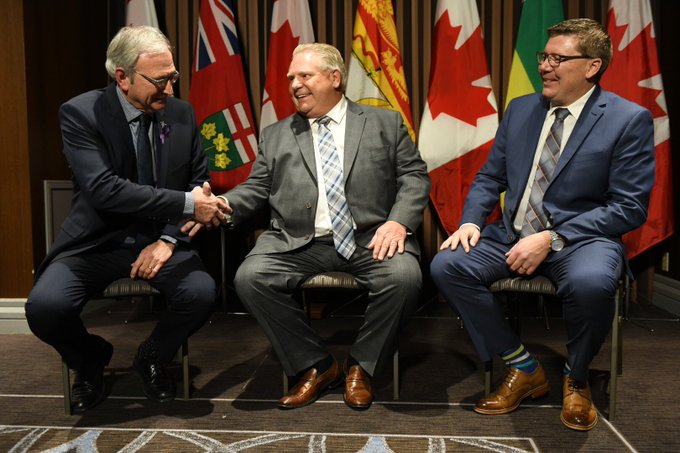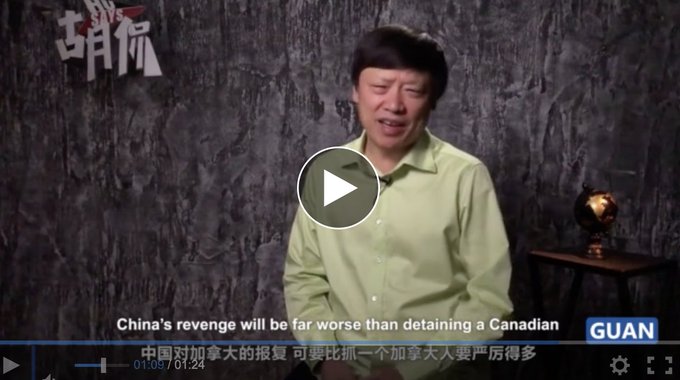8 Reasons Why The 2019 Election Will Be The "Nastiest" In The History Of Canada
Canadians should be prepared for the worst.
As 2018 comes to a close, Canada heads into an election year.
Already, the political stars are aligning to make it one of the most contentious in Canadian history.
Justin Trudeau, himself, has predicted a particularly "nasty" election cycle.
TL;DR In this opinion piece, I outline 8 reasons why the 2019 Canadian election cycle could be particularly terrible.
Here are eight reasons why:
Possible foreign interference
The Canadian Centre for Cybersecurity is already warning citizens about the threat of foreign interference in public discussion ahead of the 2019 election.
In the United States, largely Russian-controlled bots spread false information and inflamatory memes online to move public opinion before the 2016 presidential election. Those insidious efforts have created a dangerous level of political division unprecedented in recent American history.
The same agents that interfered in the American election are also poised to influence voters in Canada. Such interference is a threat to national security and integrity.
These agents will exploit, foster, and amplify any issues that provoke fierce debate in Canada.
This item is first on this list because it will only exacerbate the issues that follow.
Personal attacks and strong reactions to Justin Trudeau
Justin Trudeau is a controversial figure. A recent poll, for example, shows his approval rating at a record low level.
But despite this unpopularity, his party is poised to retain, and even grow their majority government in the 2019 election.
These projections speak less to the popularity of Trudeau himself than to the perceived lack of a viable alternative. The federal Conservatives and NDP are still scrambling to land on a rallying message.
But attacks on Trudeau are sure to be a winning strategy. Opposition parties may take advantage of the prime minister's unpopularity to rouse Canadians who disapprove of his performance. This could result in some pretty personal rhetorical assaults.
The unusual discrepancy between Trudeau's low popularity and the Liberals' encouraging prospects for the 2019 election will only compound Canadians' frustration with their prime minister. In fact, these divergent trends could make Trudeau a more divisive subject than ever in 2019.
The Liberal leader has vowed to run a positive campaign, but political discussion could quickly devolve into a scuffle between bullies.
Fierce debate about environmental issues
Conversations about the environment are more critical and contentious than ever. Environmental issues are sure to dominate campaigns and debate before the 2019 election.
At the centre of these debates will be the Liberal government's new carbon tax, a levy on polluting materials. While Trudeau promises that most of that revenue will return to Canadians as rebates, the tax provoked fury throughout the country. It also bolstered the popularity of conservative parties on both the federal and provincial levels who rallied against it.
There are also ongoing environmental debates between provinces that have already stirred controversy. Recall that last week, Quebec premier François Legault denounced further pipeline construction.
In response, thousands of people in oil-rich Alberta took to social media to voice their support for a boycott of all products from Quebec. Some have even called for a revival of the Alberta separatist movement.
Such extreme sentiments certainly represent a minority, but they do demonstrate how loaded environmental issues are in Canada.
On one hand, Canadians should be thankful that environmental policy actually captivates the national attention (unlike, for example, in the United States). On the other, because this debate implicates everything from the economy to the Canadian federation, it is sure to be fierce. The stakes are high.
Possible protests
The carbon tax and surrounding debate could fuel protest movements not unlike the "gilets jaunes" movement that has taken over the streets of Paris and forced French president Emmanuel Macron to make concessions on his own planned tax. Already, small protests across Canada are mimicking the French demonstrators, but with a troubling far-right twist.
It is impossible to predict whether similar protests in Canada could reach the scope of those in France. But it is clear, at least, that a populist trend is emerging.
Moreover, as discussions about the environment and economic mobility become more heated, public figures in Canada will undoubtedly exploit protest and grassroots movements to fortify their political standing. There is a scenario in which Canadian politics dissolve into the kind of ferocious camps that have immobilized the American government.
Growing conflicts with Saudi Arabia and China
As Canada heads into 2019, tensions with other world powers continue to brew.
Over the summer of 2018, Canada's criticism of human rights abuses in Saudi Arabia prompted a harsh response from the restrictive absolute monarchy, which included a cessation of diplomatic relations and an order for Saudi students in Canada to return home.
The assassintation of Washington Post journalist and critic of the Saudi government, Jamal Khashoggi, by Saudi agents only enflamed tensions.
Now, as Saudi Arabia continues its brutal war in Yemen, there are mounting calls for Western powers to withdraw military support from the oil-rich regime. The government of Canada is reportedly scrambling to do just that.
International attention to and the sensationalization of these disputes (Khashoggi, among other journalists, was named Time "Person of the Year") has only stirred arguments in Canada about the government's response.
Canada's responsibility to uphold human rights, and financial and military ties to Saudi Arabia will likely become central campaign issues before the 2019 election. Because the matter involves both brutal murder and the future of Canadian foreign policy, discussions will likely be passionate and even nauseating.
Meanwhile, across the world, another conflict is developping. The arrest of Meng Wanzhou, CFO of Chinese telecomm company Huawei, by Canadian authorities led Chinese officials to detain three Canadian nationals. The Chinese government has also threatened further retaliation if Canada extradites Wanzhou to the United States.
This puts the Canadian government in a position where it must choose between its duty to its allies and the law and, potentially, the well-being of its citizens.
There is, unfortunately, no end in sight for this drama, which will likely play out concurrently with 2019 election campaigns.
Caught between the ire of two world powers, Canada will see debates about its place in the world reach a critical point next year.
The uncertrain fate of a controversial new trade deal
Perhaps the biggest news in Canada in 2018 involved the drama surrounding a new trade deal between Canada, the United States, and Mexico to replace the North American Free Trade Agreement (NAFTA)
For months, president Trump berated Canadian leaders and disparaged the Canadian economy in order to coerce the government to agree to disadvantagous deal.
Finally, after intense negotiations, the prime minister and presidents of the U.S. and Mexico met to sign the new pact, titled either the United States, Mexico, Canada Agreement (USMCA) or CUSMA ("Canada first") depending on whom you ask.

Canada agreed to some concessions, however. Most controversially, the dairy supply management will be relaxed slightly to allow some American producers access to the restrictive Canadian market. While that may make some dairy products cheaper in Canada, dairy farmers, particularly in Quebec, will likely see diminished profits.
The opposition will likely lambast Trudeau for appearing to abandon the interests of Canadian farmers. But uncertainty about the future of the USMCA could be even more politically damaging.
Despite the largely symbolic signing cermony (which gave the three government heads the photo opportunity they so desperately craved), the trade deal still must be ratified by legislative bodies in all three countries. That's no guarantee in the United States, where a split Congress is about to take its seat.
The Democrat-controlled House will likely block any legislation, including a major trade agreement, that the Trump administration attempts to force through Congress.
If the USMCA fails to pass in the United States, NAFTA will remain in place. But months of criticism have made the Clinton-era pact a political liability. Moreover, the Trudeau government invested a great deal of time and political capital into the USMCA draft. Its failure would be an embarrassment.
The United States is Canada's greatest trading partner. The economies of both countries and even the livlihoods of thousands of Canadians is at stake.
This debate is going to get personal.
Trump
This will be the first Canadian federal election since Trump took office in 2017. By now, his style has infected Canadian politics, too.
The American president has set a new, unfortunate standard for political discussions. Canadians should expect more bombastic and maybe even vile rhetoric coming out of election campaigns.
Debates about an appropriate Canadian response to Trump will also undoubtedly surface. Earlier this year, for example, Trudeau received criticism for his initial reluctance to comment on the Trump administration's policy of separating migrant families and storing young children in cages.
These discussions could fundamentally reshape for the U.S.-Canada relationship either for the better or worse.
Debate about the security of the French language
It is so far unclear just how intense such debates could become, but they do seem to be emerging.
When Ontario premier Doug Ford scrapped plans to found a Francophone university in the province and threatened to cut other Francophone services, a massive blacklash ensued.

Ford was forced to withdraw some of those plans, but even the suggestion was enough to have far-reaching consequences. In Montreal, for example, the media was quick to criticize mayor Valérie Plante for giving a speech entirely in English. Some even cited Ford's threat to Francophone services as a reason to more staunchly promote the minority language.
French language protection is at the core of Canadian federalism. If political leaders do not demonstrate their commitment to that tenet, they could stir separatist sentiments.
Canada is in for a raucous election year.











No comments:
Post a Comment
Comments always welcome!